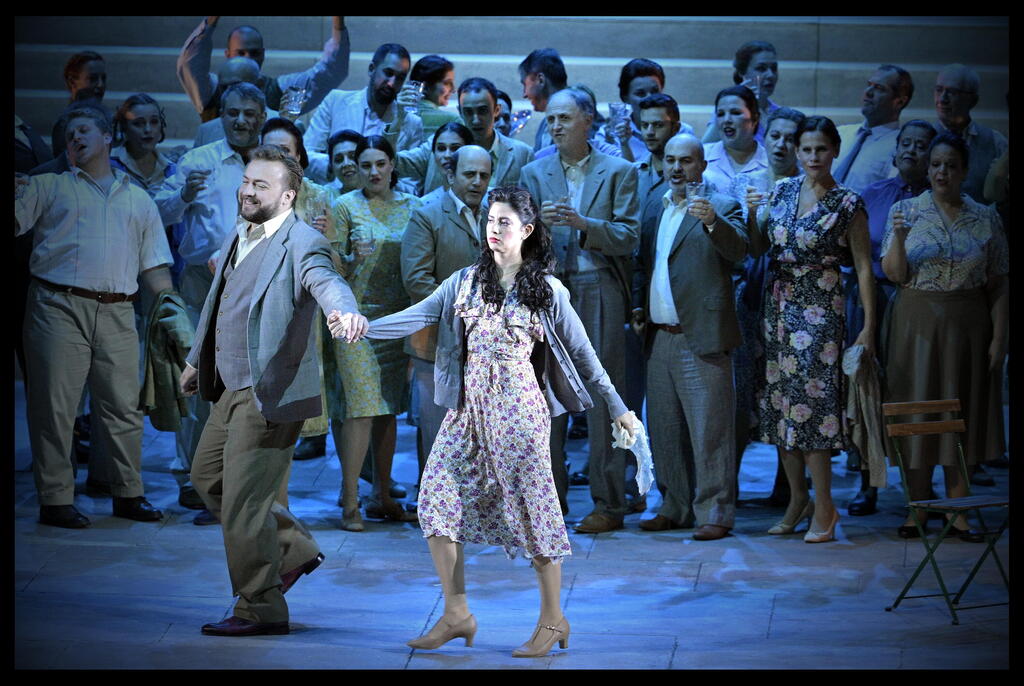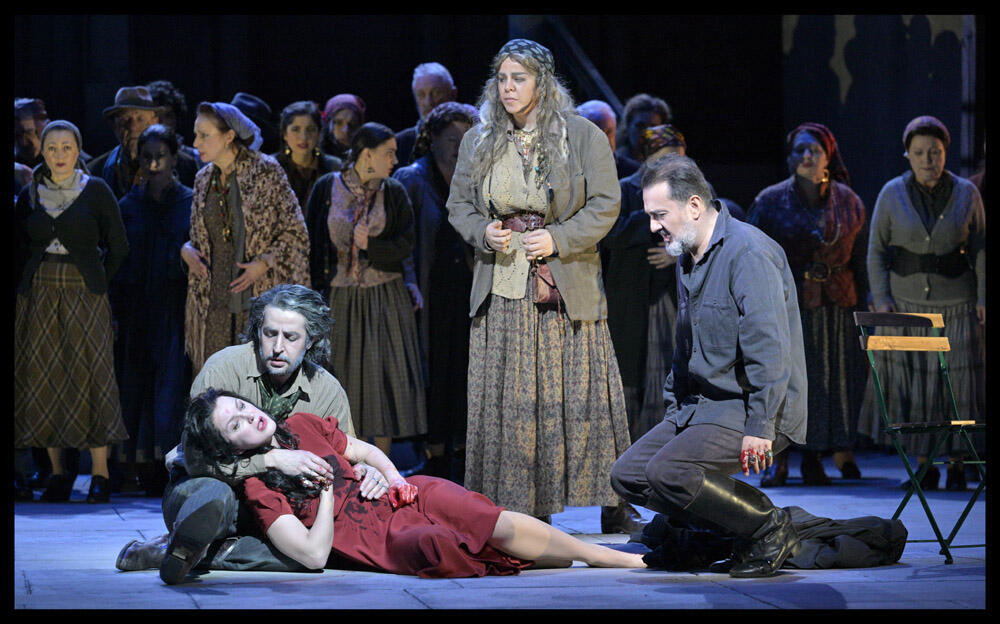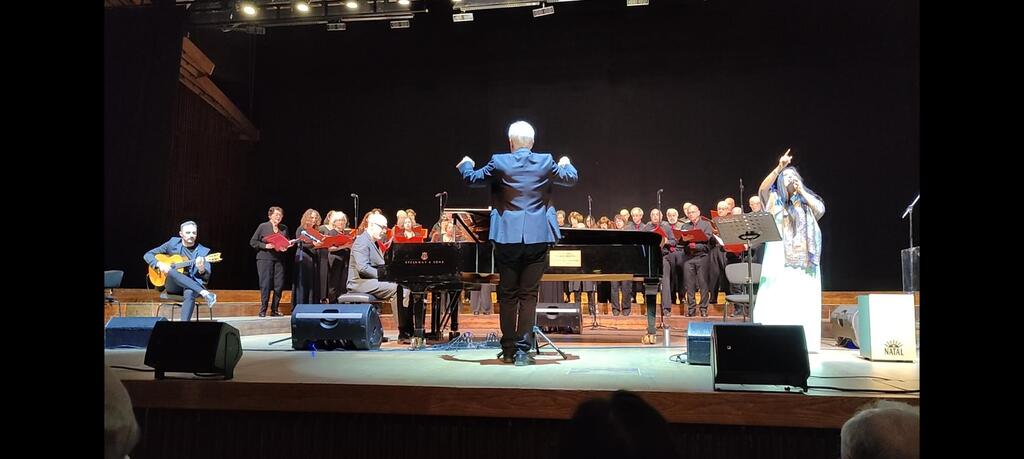An infrequent double bill
The Israeli Opera is currently presenting an unusual double bill: Aleko, an opera in one act, by the immortal Russian composer Sergei Rachmaninoff, and Cavalleria Rusticana, a melodrama in one act, by the Italian composer Pietro Mascagni.
This novel production, which makes use of the same stage setting for both works, is from the ABAO, Bilbao [Spain] Opera.
Interestingly, both of these contemporary works premiered in the composers’ respective countries in the 1890s. The former is actually being performed for the first time ever this week in Tel Aviv; the latter had at least one run here previously, in 1992, but is still very infrequently seen in this country.
Like the production itself, the director, Joan Anton Rechi, and the set designer, Gabriele Moreschi – both from southern Europe – are first-timers with the Israeli Opera. On the other hand, the vast majority of the cast is local talent, most of them artists that Tel Aviv audiences are used to seeing on stage.
Still, three soloists in major roles are making their Israel Opera debuts this week, two of them in lead roles. Russian soprano Anastasia Boldyreva was impressive in the premiere as the wretched and wronged Santuzza in Cavalleria Rusticana.
The male debuts are Russian bass Lev Elgardt, in the role of the Old Gypsy in Aleko, and Elchin Azizov, a baritone from Azerbaijan, in not one but two important roles: Aleko, the lead in the opera of the same name, and Alfio in Cavalleria Rusticana. Of course, he never sings both these roles on the same night; rather, he switches with the familiar Romanian baritone Ionut Pascu in the same two roles on alternate nights.
Russian tenor Sergei Poliakov turned in a notable performance as Turiddu, the doomed betrayer of Santuzza, while guest conductor Alessandro de Marchi wielded the baton for both operas, at the podium of The Opera Orchestra, The Israel Symphony Orchestra Rishon LeZion. The Israel Opera Chorus was in usual good form in each of the musically very different works.
Both operas are tragedies born of passion, jealousy, and rage, as the illicit lovers of two unfaithful wives (and one of the women), are slain by angry husbands. The difference is that Aleko shows remorse, and receives punishment of sorts, while the audience is left to wonder in Cavalleria Rusticana as to the fates of the wrathful Alfio and his flighty wife, Lola.
Using the same stage setting of the church square of a Sicilian village is a bit contrived when the first opera of the duo revolves around the dynamics of a rootless gypsy clan. There were also occasional lapses in the direction in each work.
In the end, however, it is worth making the effort to see these two so rarely performed operas by two very different yet equally brilliant composers (who achieved fame and recognition in their lifetimes) – Rachmaninoff, the Russian Romanticist, and the lesser-known Mascagni, the Italian who ushered in the verismo school of operatic tradition, to which belong as well the operatic repertoire mainstays Pagliacci and Tosca.
The current production runs through January 22. The next opera, in February, will be Ariodante, by Georg Friderich Handel.
An unforgettable Latin American mass
It’s a very long way from Argentina to Israel, but fortunately for music lovers, a talented group of musicians braves the long journey every few years to perform Misa Criolla, a masterpiece of the current era of vernacular Catholic masses, which were sanctioned by the Vatican in 1962. Misa Criolla was composed by Argentinean composer Ariel Ramirez in 1964, and quickly became an international hit; it was even eventually performed as one of the Israel Opera’s music series concerts.
Ramirez toured the world – including stops in Israel – conducting his Spanish-language mass set to music incorporating indigenous Latin American rhythms and native instruments. Now his son Facundo, an accomplished musician in his own right, is continuing his late father’s tradition, with three concerts this past week in three cities: Ashdod, Kiryat Motzkin and the Frederick Mann Auditorium in Tel Aviv.
Ramirez, himself a pianist, brought with him instrumentalists on the guitar, percussion and pan pipes, as well as the powerful and expressive vocalist Maria “La Bruja” Salguero. The visiting ensemble joined forces here with the Israel Kibbutz "Ichud" Choir, under the direction of Ronen Borshevsky.
Since the Misa Criolla is not a long work, the first half of the concert was devoted to other compositions of Ariel Ramirez, who had composed many popular songs based on folk music, as well as works of other contemporary Latin American composers. The mass itself – comprising Kyrie, Gloria, Sanctus, Credo and Agnus Dei – was performed after the intermission, brought to a crowd-pleasing end with a brief encore of part of the Gloria, the most rousing element of the composition.




